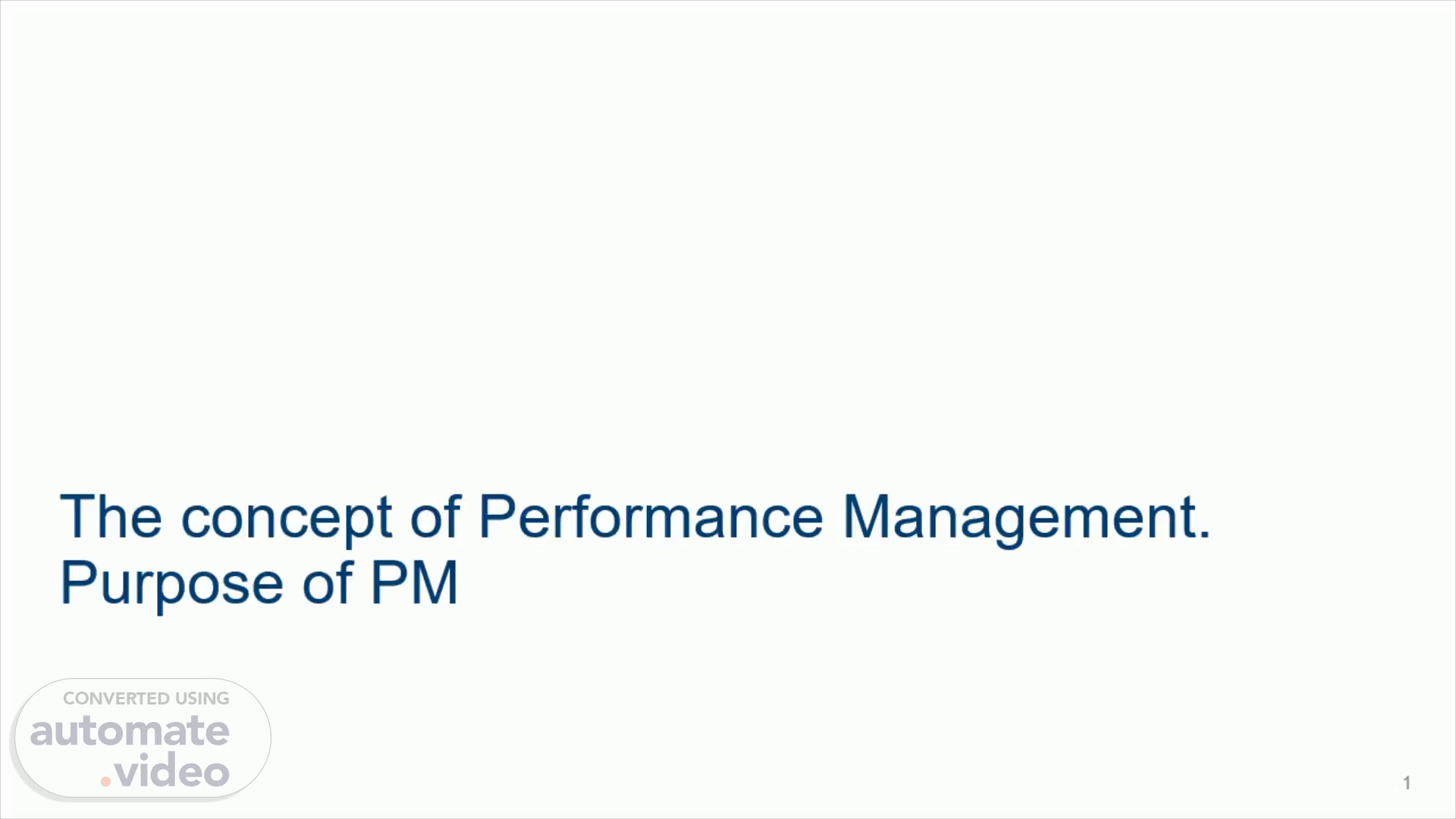
The concept of Performance Management. Purpose of PM
Scene 1 (0s)
The concept of Performance Management. Purpose of PM.
Scene 2 (7s)
Learning Objectives. 2. 2.1 Define Performance Management and Performance Appraisal 2 .2 Contributions of Performance Management to Managers, Employees and the Organisation 2 .3 Disadvantages of poorly implemented performance management systems 2 .4 Purpose of Performance Management.
Scene 3 (21s)
3. Performance Management in Context - Overview. Definition of Performance Management (PM) and Performance Appraisal (PA) The PM Contribution Disadvantages/Dangers of Poorly Implemented PM Systems.
Scene 4 (32s)
4. Definition of Performance Management. 1. Continuous process of … Identifying Measuring Developing … the performance of individuals and teams 2. Aligning performance with the strategic goals of the organization.
Scene 5 (44s)
5. Definition of Performance Management (cont.). Performance management is an ongoing communication process, undertaken in partnership between an employee and his or her immediate supervisor, that involves establishing clear, shared expectations and understanding about : ■ the essential job functions the employee is expected to do ■ how the employee’s job contributes to the goals of the organization ■ what “doing the job well” means in concrete terms ■ how employee and supervisor will work together to sustain, improve, or build on existing employee performance ■ how job performance will be measured ■ identifying barriers to performance and removing them.
Scene 6 (1m 10s)
6. Activity 2.1 - How to create a performance management system for organisations.
Scene 7 (1m 38s)
7. Definition of PM (continued). Performance management (PM) is NOT Performance appraisal (PA).
Scene 8 (1m 56s)
8. Definition of PM (continued). PM. Strategic business considerations Driven by line manager Ongoing feedback So employee can improve performance.
Scene 9 (2m 8s)
9. Contributions of Performance Management. For Employees For Managers For Organization/HR Function.
Scene 10 (2m 17s)
10. Contributions of Performance Management for Employees.
Scene 11 (2m 27s)
11. Contributions of Performance Management f or Managers.
Scene 12 (2m 40s)
12. Contributions of Performance Management f or Organization / HR Function.
Scene 13 (2m 51s)
13. Disadvantages of Poorly Implemented PM Systems.
Scene 14 (3m 0s)
14. Disadvantages of Poorly Implemented PM Systems for Employees.
Scene 15 (3m 11s)
15. Disadvantages of Poorly Implemented PM Systems for Managers.
Scene 16 (3m 22s)
16. Disadvantages of Poorly Implemented PM Systems for Organization/HR Function.
Scene 17 (3m 32s)
17. Activity 2.2 – eTextbook reading. Activity No. 2.2 Activity Name eTextbook reading, Case Study Learning Objective Define Performance Management and Performance Appraisal Time Limit (incl. Discussion) 15 min Format Class Discussion in a Case Study Exercise Material Case Study, Chapter 1, p. 9, eTextbook Student Instructions Read the case in the eTextbook – Chapter 1, page 9 and discuss what’s wrong with the PM process in the case. Recommend strategies for improvement. Faculty Instructions Teacher will guide the students to the case in the eTextbook , p. 9 and will enable class discussion after students read the case. Method All students will read the case individually Marking NA.
Scene 18 (4m 5s)
Purpose of Performance Management. 18.
Scene 19 (4m 11s)
19. Purpose of Performance Management. Strategic Administrative Informational Developmental Organizational maintenance Documentation.
Scene 20 (4m 20s)
20. Strategic Purpose. Link individual goals with organization’s goals Communicate most crucial business strategic initiatives.
Scene 21 (4m 28s)
21. Administrative Purpose. Provide information for making decisions regarding: Salary adjustments Promotions Retention or termination Recognition of individual performance Layoffs.
Scene 22 (4m 38s)
22. Informational Purpose. Communicate to employees: Expectations What is important How they are doing How to improve.
Scene 23 (4m 48s)
23. Developmental Purpose. Performance feedback/coaching Identification of individual strengths and weaknesses Identification of causes of performance deficiencies Tailor development of individual career path.
Scene 24 (4m 59s)
24. Orgainsational Maintenance Purpose. Plan effective workforce Assess future training needs Evaluate performance at organizational level Evaluate effectiveness of HR interventions.
Scene 25 (5m 9s)
25. Documentation Purpose. Validate selection instruments Document administrative decisions Help meet legal requirements.
Scene 26 (5m 17s)
26. Activity 2.3 – Purpose of Performance Management.
Scene 27 (5m 48s)
27. Summary Q & A Next Unit…. For When Reminders Matter - Icon Summary Png - 580x388 PNG ....